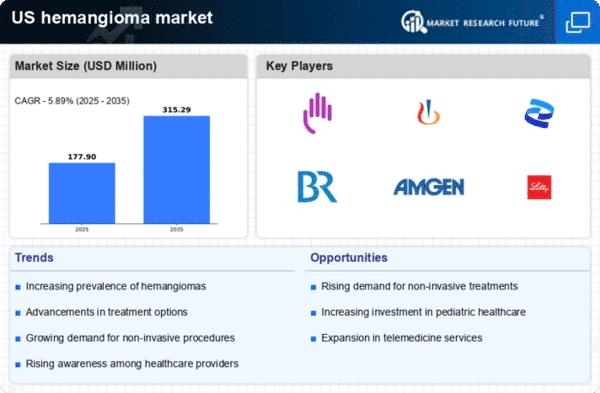Increased Research Funding
The allocation of research funding towards the study of hemangiomas is a critical driver for the hemangioma market. Government and private organizations are increasingly recognizing the need for comprehensive research into the causes, treatment, and management of hemangiomas. This influx of funding is expected to facilitate clinical trials and the development of new therapeutic agents, potentially leading to breakthroughs in treatment. As research progresses, it may result in the introduction of novel therapies that could reshape the landscape of the hemangioma market. The anticipated growth in research initiatives is likely to enhance the overall understanding of hemangiomas and improve patient care.
Rising Healthcare Expenditure
The upward trend in healthcare expenditure in the US is a significant driver for the hemangioma market. As healthcare budgets expand, there is a greater focus on specialized treatments and interventions for conditions like hemangiomas. Increased spending allows for better access to advanced therapies and technologies, which can enhance patient outcomes. Furthermore, as more healthcare facilities invest in state-of-the-art equipment and training, the quality of care for hemangioma patients is likely to improve. This increase in healthcare expenditure may also encourage pharmaceutical companies to invest in research and development, further propelling the growth of the hemangioma market.
Rising Incidence of Hemangiomas
The increasing incidence of hemangiomas in the US is a notable driver for the hemangioma market. Recent data indicates that approximately 1-3 % of infants are affected by these vascular tumors, leading to a growing demand for effective treatment options. As awareness of hemangiomas rises among healthcare professionals and parents, the need for specialized care and intervention becomes more pronounced. This trend is likely to stimulate market growth as healthcare providers seek innovative solutions to manage these conditions. Furthermore, the rising incidence may prompt further research and development initiatives, potentially leading to new therapies and treatment modalities within the hemangioma market.
Technological Innovations in Treatment
Technological advancements in medical devices and treatment methodologies are significantly influencing the hemangioma market. Innovations such as laser therapy, cryotherapy, and advanced imaging techniques have enhanced the ability to diagnose and treat hemangiomas effectively. For instance, laser treatments have shown promising results in reducing the size of hemangiomas, thereby improving patient outcomes. The market for these advanced treatment options is projected to grow, with estimates suggesting a compound annual growth rate (CAGR) of around 5-7 % over the next few years. As these technologies become more accessible, they are likely to drive further interest and investment in the hemangioma market.
Growing Demand for Non-Invasive Treatments
There is a notable shift towards non-invasive treatment options for hemangiomas, which is shaping the hemangioma market. Patients and healthcare providers are increasingly favoring treatments that minimize discomfort and recovery time. Non-invasive methods, such as topical medications and laser therapies, are gaining traction due to their effectiveness and reduced side effects. This trend is likely to drive market growth as more patients seek alternatives to traditional surgical interventions. The demand for these non-invasive solutions may lead to increased competition among manufacturers, fostering innovation and potentially lowering costs within the hemangioma market.
















